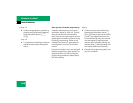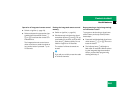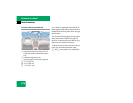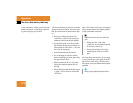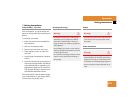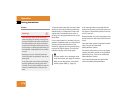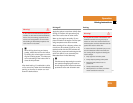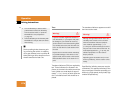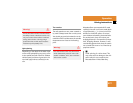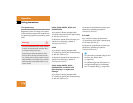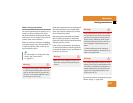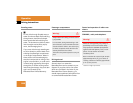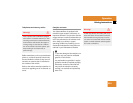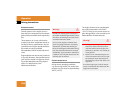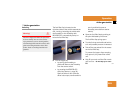
276
Operation
Driving instructions
Tires
Treadwear indicators (TWI) are required by
law. These indicators are located in six
places on the tread circumference and be-
come visible at a tread depth of approxi-
mately
1
/
16
in (1.6 mm), at which point the
tire is considered worn and should be re-
placed.
The treadwear indicator appears as a solid
band across the tread.
Specified tire inflation pressures must be
maintained. This applies particularly if the
tires are subject to extreme operating con-
ditions (e.g. high speeds, heavy loads, high
ambient temperatures).
ț Turn the SmartKey to starter switch
position 0 and remove the SmartKey
from the starter switch, or press the
KEYLESS-GO* start/stop button
(
୴ page 35).
ț Take the SmartKey or the SmartKey with
KEYLESS-GO
* with you and lock vehicle
when leaving.
!
Set the parking brake whenever park-
ing or leaving the vehicle. In addition,
move gear selector lever to position P.
When parking on hills, always turn front
wheels towards the road curb.
Warning! G
If you feel a sudden significant vibration or
ride disturbance, or you suspect that possi-
ble damage to your vehicle has occurred,
you should turn on the hazard warning flash-
ers, carefully slow down, and drive with cau-
tion to an area which is a safe distance from
the road.
Inspect the tires and the vehicle underbody
for possible damage. If the vehicle or tires
appear unsafe, have it towed to the nearest
Mercedes-Benz Center or tire dealer for re-
pairs.
Warning! G
Although the applicable federal motor vehi-
cle safety laws consider a tire to be worn
when the treadwear indicators (TWI) be-
come visible at approximately
1
/
16
in
(1.6 mm), we recommend that you do not al-
low your tires to wear down to that level. As
tread depth approaches
1
/
8
in (3 mm), the
adhesion properties on a wet road are
sharply reduced.
Depending upon the weather and/or road
surface (conditions), the tire traction varies
widely.
୴୴



